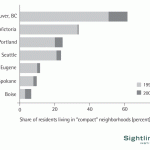Search Results
-
Alan Goes to Town Hall
On Wednesday Sightline’s fearless leader Alan Durning will be speaking at Seattle Town Hall with the CEO of Cascadia Region Green Building Council, Jason McLennan. The title of the seminar is “Exploring energy and design: smart solutions for the built environment.” Here’s a blurb: As the prospect of global economic crisis hits home, there is hope. The work being done to combat climate change through smart community design, green building...Read more » -
Vancouver's Greenest City Action Team Releases Recommendations
Vancouver, BC’s Greenest City Action Team—which includes Sightline board member Gordon Price convened by Mayor Gregor Robertson last week revealed its “Urgent Quick Start Recommendations.” At first I thought this was going to be a laundry list of boring policies with a lot of foot notes. Instead, the recommendations, developed ahead of the 2010 Olympic Games, are kind of a catalog of interesting ideas to make cities more sustainable. Vancouver’s...Read more » -
Washington's At-Risk Forests
A new comprehensive report—Retention of High-Valued Forest Lands at Risk of Conversion to Non-Forest Uses in Washington State—makes a good contribution to land use policy. Not only does it provide a detailed analysis of the causal factors behind forest clearing, but it includes some interesting maps of forestlands that are at especially high risk. Best of all, the report offers a range of real solutions: This report examines other states’ efforts...Read more » -
The Green Building Race
I’m loving the spirited competition in green building that seems to be emerging among Northwest cities. Of course, Portland and Seattle have well-established programs, but Northwest cities big and small boast an impressive roster of energy-smart buildings. The latest (and possibly greatest) addition comes from Vancouver, which busted out with a new convention center that is surely one of the all-time grooviest buildings : A sprawling, six acre green roof that’ll be the...Read more » -
Compact Neighborhoods
Low-density sprawl—where houses, jobs, and stores are spread out, and virtually every trip requires a car—remains the norm in Cascadia’s major metropolitan areas. But compact neighborhoods are gradually gaining ground: since 1990, the share of residents living in walkable or transit-oriented neighborhoods has increased in each of the seven largest major Northwest metropolitan areas. Poorly planned, low-density sprawl contributes to a panoply of ills. It confines residents in their cars...Read more » -
Green Schools, Smart Financing 3
I’ve written twoposts about Han’s Dunshee’s proposed legislation to borrow $3 billion to retrofit Washington schools. The proposal would have the state borrow money, make money-saving improvements to school buildings, and then use the savings to help pay back the loan. The Washington Policy Center (WPC) has criticized both the bill and also the general idea that investment in building green is worth the money. I was curious to find...Read more » -
But is it Affordable?
Last summer, the Canadian Centre for Policy Alternatives (CCPA) prepared a report to the Vancouver City Council on the city’s EcoDensity Initiative pointing out the initiative’s weakness on affordability. The backers of EcoDensity, a City initiative to make environmental sustainability a primary goal in all city planning decisions, argue that increasing supply by adding density will result in a decrease in housing costs. That follows basic economic principles, but we...Read more » -
Yes, I'd Like Fries With That
I’ll admit, I’m a bit of a foodie (let’s just say I don’t turn down a good cream sauce), but I also try to eat healthy food when I can. So I was a little shocked when I came across this study on food choices today. In the experiment, 100 college students were presented with two menus. One included fries, chicken nuggets, and a baked potato, and another with those...Read more » -
And Again
Another thoughtful Canadian voice—this time, the respected National Round Table on the Environment and the Economy—endorses comprehensive climate pricing. The Globe and Mail reports. The group noted that any cap-and-trade system that covers only big, industrial polluters won’t stand a chance of success. Are you listening, New Democrats?Read more » -
Green Schools, Smart Financing 2
A couple of weeks ago I wrote about Representative Hans Dunshee’s proposal to borrow $3 billion to retrofit schools. Part of what made the proposal interesting was that the $3 billion would be paid back, at least in part, with savings in energy costs. (Dunshee’s legislation has moved into the rules committee, but it is still unclear exactly how the energy savings would be captured.) There have been some school...Read more »


